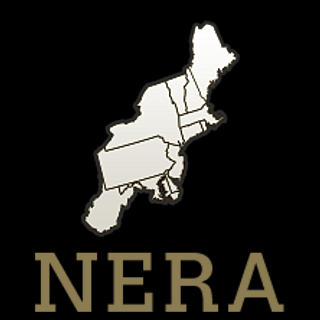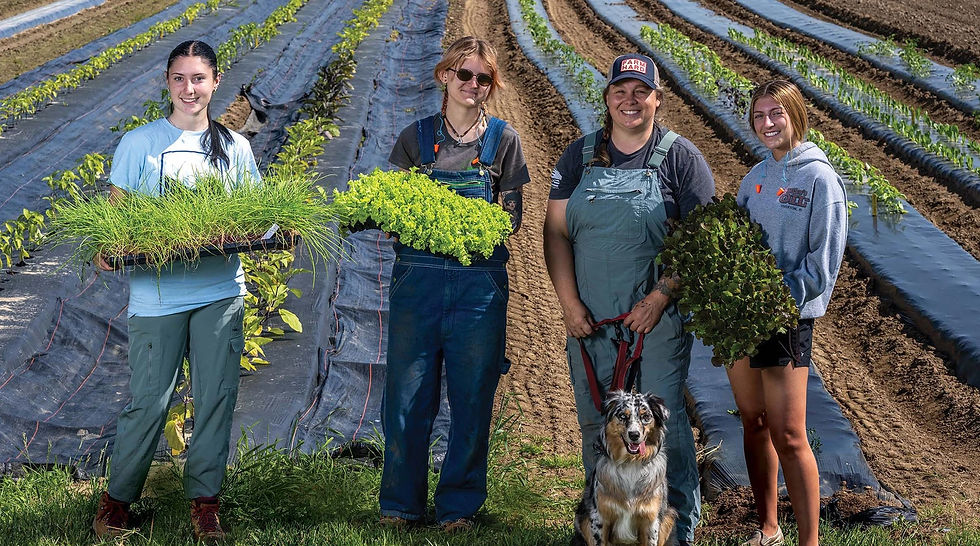Smart Food, Stronger Communities: Innovation in Action Across the Northeast
- nerasaes
- Apr 28, 2025
- 4 min read
Article by Stacey Stearns, UConn Extension
Land-grant institutions lead the charge in translating nutrition science into real-world impact for diverse communities.
In a region known for its dense population and vibrant communities, addressing food insecurity and nutrition disparities is both urgent and complex. From rural towns in New Hampshire to urban centers in Connecticut and across the agricultural communities of New York, Land-grant universities are rising to the challenge—bringing evidence-based nutrition education directly to those who need it most.
Through strategic programming and deep community partnerships, the University of Connecticut, the University of Maine, the University of New Hampshire, and Cornell University are transforming how residents' access, understand, and embrace healthy eating. Their collective work, grounded in research and delivered through Cooperative Extension, embodies the spirit of the Northeast Agenda: a commitment to resilient food systems, regional collaboration, and community health.
University of Connecticut: Building Trust and Changing Habits
In some of Connecticut’s neighborhoods, nutrition education is helping to reshape lives. UConn Extension’s Expanded Food and Nutrition Education Program (EFNEP) and Supplemental Nutrition Assistance Program Education (SNAP-Ed) reach more than 1,500 adults and 4,200 youth annually, many of whom live in areas experiencing persistent poverty.
These programs go beyond basic food facts. UConn Extension professionals use a behavior-focused approach that helps participants make sustainable lifestyle changes like planning nutritious meals on a budget, increasing physical activity, and managing food safety at home.
Evaluations show the impact is tangible. Eighty-one percent of adult participants reported improvements in diet quality, and more than two-thirds learned to better manage their food dollars. These results not only reflect individual gains but also signal broader community benefits—healthier families, reduced healthcare costs, and improved quality of life.
Through participant responsive education and practical skill-building, UConn’s efforts reinforce a core value of the Northeast Land-grant system: ensuring science-backed tools reach all communities, regardless of income or geography.
University of Maine: Tackling Nutrition Insecurity and Childhood Obesity
The Maine EFNEP program is making significant strides in addressing the pressing issues of childhood obesity and nutrition insecurity among youth. Recognizing the alarming rates of food insecurity and obesity, EFNEP provides essential education on healthy eating habits, physical activity, and effective food management practices. In 2024, the program nearly doubled its reach, engaging 3,140 youth in a series of educational lessons designed to foster long-term health improvements. The impact of these lessons is substantial: 79% of participants enhanced their ability to choose foods according to current Dietary Guidelines, 43% increased their daily physical activity, 50% adopted safer food handling practices, and 34% improved their skills in preparing simple, nutritious meals. These efforts are crucial in combating the high rates of food insecurity and obesity, which continue to strain health promotion programs and elevate healthcare costs. By empowering youth with the knowledge and skills needed for self-sufficiency and nutritional health, EFNEP is fostering a healthier future for Maine's children, ensuring they develop lifelong habits that contribute to their overall well-being.
University of New Hampshire: Empowering Parents to Lead Healthier Lives
Across state lines in New Hampshire, the University of New Hampshire Extension is taking a generational approach to nutrition. By working directly with parents and caregivers, UNH is helping families make lasting changes that benefit children and adults alike.
Using a hands-on, interactive EFNEP curriculum, educators guide participants through lessons on meal planning, shopping strategies, and nutrition label literacy. The goal is to equip caregivers with the knowledge and confidence to lead their households toward healthier living.
Participants not only improve their dietary habits but also learn how to engage their children in healthier food choices, creating ripple effects that strengthen long-term wellness. This aligns closely with the Northeast Agenda’s focus on family-centered community health and inclusive educational practices.
UNH’s work shows that effective nutrition programming isn’t just about food, it’s about trust, relationship-building, and recognizing the lived experiences of the people served. By embedding education in community settings, the university strengthens both individual and regional resilience.
Cornell University: Systemic Impact Through Nutrition Policy and Training
While local programs drive immediate change, Cornell University is creating long-term impact through leadership in EFNEP curriculum design, policy engagement, and workforce training. As a statewide hub for nutrition education, Cornell supports a network of Extension professionals who serve thousands of families across New York.
In 2022 alone, Cornell’s EFNEP programming reached more than 11,000 adults and youth. Behind the scenes, faculty and staff developed standardized training systems and evaluation frameworks that ensure program consistency and quality from Buffalo to the Bronx.
This approach exemplifies Land-grant innovation: scaling up best practices to reach many populations while maintaining a personal, local connection. Cornell’s commitment to shared evaluation and capacity-building also supports the Northeast Agenda’s emphasis on inter-institutional collaboration and science-driven solutions.
Through strategic leadership, Cornell ensures that nutrition education remains both adaptable and evidence-based, helping families make informed choices in a constantly shifting food landscape.
Looking Ahead: Nutrition as a Pathway to Regional Resilience
Together, these universities illustrate how Land-grant institutions can move the needle on food insecurity, through direct service, innovation, partnership, and policy-informed practice.
Their efforts speak directly to the priorities outlined in the Northeast Agenda, particularly the vision of promoting equitable food systems and fostering community well-being. As funding landscapes shift and public health challenges evolve, these programs remain essential pillars of support in their communities.
By advancing nutrition education rooted in local needs and scientific rigor, UConn, UNH, and Cornell are not only feeding bodies, they’re also nourishing futures.




